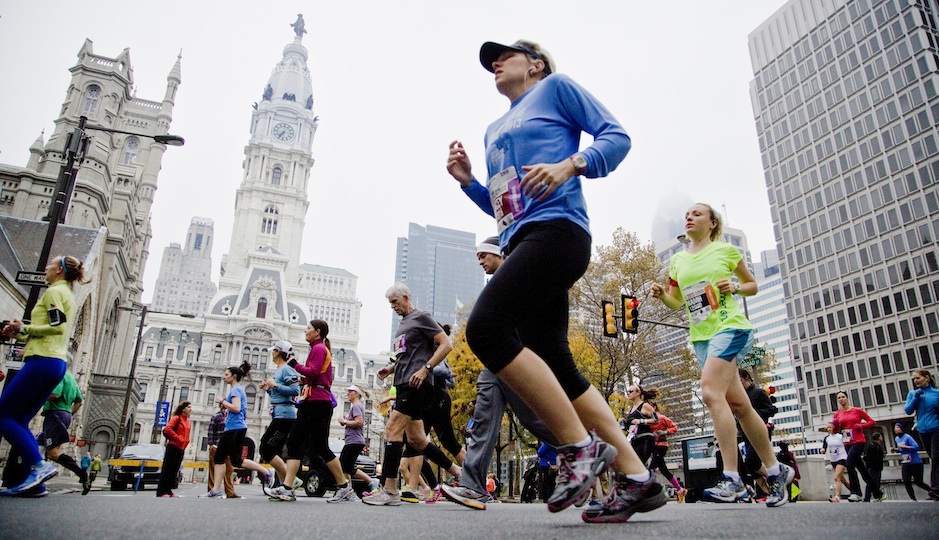20 Training Tips for First-Time Marathoners from a First-Time Marathoner

Philadelphia Pressroom
On October 11th of this year, I successfully finished the Chicago Marathon. Considering I ran my first 5K just two years prior to this race, it was a pretty eye-opening experience and I learned a lot. Below, the 20 best tips that I learned from finishing my very first marathon.
1. Mentally prepare yourself
A full marathon is not something to be taken lightly. You need to prepare yourself mentally for this challenge just as much physically. Do not just jump in, because the journey in front of you is going to be tough and you need to be mentally ready.
2. Read, read, read
As a part of that mental preparation, invest in some marathon-training reading. I read books by Hal Higdon, Joe Henderson, Bruce Van Horn and Ben Kaplan before I even put a foot to the ground. And personally, all that reading helped me to be prepared for the road ahead.
3. Pick an attainable goal
In a lot of those books I read, they recommended the goal of a first-time marathoner should be to just finish. While shooting for a specific time is nice, your goal really should be to just make it across the finish line. Looking at it that way takes off some pressure and makes your goal a lot more attainable. That doesn’t mean you shouldn’t set a specific time goal, just make sure it’s reasonable.
4. Buy gear
Assuming the half-marathon distance is the most you’ve run so far, you will need to start buying gear. For me it was a hydration vest, foam roller, new shoes, compression gear and a few other things. Your long runs will start to be longer distances than you have ever run before, and you need to be ready for them.
5. Accept (and try to prevent) injuries
Getting injured and training for a marathon go together like PB & J. You’re about to put your body through a lot more stress than it‘s used to, and injuries are bound to happen. Do your best to accept this fact and prevent them as best you can. Stretching and foam-rolling help a lot. (You can find running-coach-approved tricks for preventing injury during training here.)
6. Pick a major run
For me, it was the Chicago Marathon. There are many reasons a race may be significant to you, but pick one that will be truly memorable. You are going to make lifelong memories no matter which race you choose, but picking a nationally recognized race can easily make the memories even greater.
7. Join a running club
Training for a marathon can be a long and lonely path. You will have countless runs that test you physically and mentally. Try and join a local running club to help commiserate with people who have been there before or are experiencing the same thing. (You can take your pick of running clubs from this very, very long list.)
8. Train for a half marathon first
If you’ve never run a half before, you really should train for one. The half marathon is a great way to dip your toes into the marathon pool before you dive right in.
9. Treat long runs like an official race
Long runs for half marathons are not the same as marathon-training long runs. For half-training long runs, I could just go out there and run. For marathon long runs, I needed to plan my schedule around them, get up early and make sure I had enough gear to last me. In other words, I had to get myself ready the same as I would on race day. (If you’re at a loss for where to actually run during your long runs, you can find the best Philly long run locations here.)
10. Run for charity
There are a million reasons to run for charity. For me, I ran Chicago for autism research. Beyond the money I raised for a good cause, the charity also had amenities set up for me on race day that other runners didn’t have (a race day breakfast, private gear check and toilets, etc.). Chances are, you’re about to work harder at one goal than you ever have before. It makes sense to make all that work about something bigger than yourself.
11. Cross train
I found indoor cycling was the best thing for my training. As soon as I incorporated cycling into my training, I noticed a huge impact in my running and I felt my cardiovascular strength grow so much. Find an exercise that isn’t running and make it work for you. (For cross-training tips, and how to work cross-training days into your workout schedule, go here.)
12. Register for other (shorter) runs
No long run will ever replace the nerves and excitement of an actual race day. Standing at a starting line with thousands of other runners is a lot different than a solo run around your neighborhood. Sign up for a half marathon or other runs to get those nerves shaken out.
13. Don’t skip a long run
In my training, I’ll admit that I did miss a few runs. However, I never missed a long run. Nothing will prepare you for this marathon the same way a long run will — don’t miss them.
14. Search properly for long runs
You are about to run some of the longest distances you ever have. Your local neighborhood route probably won’t cut it. You need to search properly for a path that can handle your distance. (You can find plenty of awesome options here.)
15. Put it online (In other words: Stay accountable)
Marathon training is hard. And when things get hard, people tend to quit. Post your goals on your blog or on social media. This way, if you ever think about quitting, the thought of having to tell people you didn’t run when they ask you about it will be a lot worse. Plus, you will get a world of support from everyone around you when times get tough.
16. Get smart about nutrition
Whatever your finish time is going to be, you’re about to test your body harder than it ever has been tested before. Your body needs to be ready to handle this. As a part of that, you should be eating properly so your body can pull the energy it needs for some of the intense long distances you will be covering.
17. Run a dress rehearsal
When you train for any race you will always hear the same advice: “Don’t try anything new on race day.” For your first marathon, you should treat your longest long run like a dress rehearsal. Wear all the same gear you will wear during the marathon, get up at the same time you expect to get up on race day and mimic your race-day experience in all areas. You do not want any surprises the day of the race.
18. Dress properly
Stalk the race-day weather reports like a mad person. You want to be fully prepared for the conditions that await you. Dress in too many or too few layers and you could suffer early out the gate. 26.2 miles is hard enough, no need to make the early miles harder.
19. Be ready to taper
I always heard about how people got nervous during the taper period: They decreased the miles they ran and were afraid they wouldn’t be ready come race day. I, on the other hand, thought I would be excited to taper. I don’t need to continue to beat up my body? I’m in! I was wrong. I slowed down the mileage and had those same fears come race day. That’s just your mind messing with you. If you taper and train properly, you’ll be more than ready on race day.
20. Have fun
Running a marathon is hard. Really hard. There is no reason to sugarcoat it. However, no one is forcing you to run it. If you’re embarking on this challenge, you are the one making that choice. So, have fun with it! You are going to create amazing memories and learn a whole lot about yourself, so enjoy the journey.
…………
Chadd Balbi is a local runner who went from running a 5K to a half marathon in eight weeks in 2013 and hasn’t stopped since. Balbi lives in Lansdale and has run every race Philly has to offer from the Back On My Feet 5-Miler, Rock ‘N’ Roll Half, Broad Street, Philly Half Marathon, Philly Tri Rock Triathlon and more. He blogs about his running adventures at Average Joe Runner.
Like what you’re reading? Stay in touch with Be Well Philly — here’s how:
- Like Be Well Philly on Facebook
- Follow Be Well Philly on Twitter
- Follow Be Well Philly on Pinterest
- Get the Be Well Philly Newsletter


